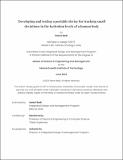Developing and testing a portable device for tracking small deviations in the hydration levels of a human body
Author(s)
Bedi, Saloni
DownloadThesis PDF (69.34Mb)
Advisor
Gray, Martha
Terms of use
Metadata
Show full item recordAbstract
Maintaining proper hydration is widely recognized as essential for overall health, yet dehydration remains a prevalent issue, particularly among vulnerable populations such as the very young and elderly, and can contribute to increased morbidity and mortality rates. There have been numerous endeavors in both academia and industry to develop non-invasive methods for monitoring hydration status, specifically in non-clinical settings. However, a practical and reliable solution for routine hydration measurements is still lacking.
To address this critical need, the hydration team at MIT has been actively working on the development of a non-invasive sensor to bridge the gap in hydration monitoring. This thesis focuses on the development of a wearable setup for the existing technology, enabling human studies to be conducted with individuals by comfortably integrating the hydration sensor into their daily routines for study periods of 24 hours and longer. The primary objective of the human studies is to investigate whether the sensor readings obtained during prolonged periods of dehydration can be distinguished from those obtained during normal (euhydrated) activities.
Throughout the course of this research, a comprehensive wearable setup was meticulously developed. Human studies were conducted in two distinct cohorts, namely Euhydration and Dehydration, where participants wore the wearable setup to capture hydration data. This allowed for the analysis of hydration trends and would help with a comparative assessment of sensor readings under different conditions.
The results obtained and the data analysis facilitates the evaluation of the wearable setup's efficacy and reliability in monitoring hydration status during prolonged periods of dehydration. Furthermore, the findings contribute to the advancement of hydration monitoring by shedding light on the potential of distinguishing between hydration states using the developed wearable setup.
Date issued
2023-06Department
System Design and Management Program.Publisher
Massachusetts Institute of Technology